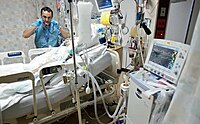
Photo from wikipedia
INTRODUCTION Patients in intensive care status are in nutritional threat and frequently present innutrition, therefore monitoring the nutritional offer becomes indispensable. AIM To purpose a control and monitoring form of… Click to show full abstract
INTRODUCTION Patients in intensive care status are in nutritional threat and frequently present innutrition, therefore monitoring the nutritional offer becomes indispensable. AIM To purpose a control and monitoring form of enteral nutritional therapy and to evaluate its resoluteness. METHODS Observational, analytical and retrospective study performed in intensive care patients receiving an enteral diet exclusively and/or associated with the oral/parenteral route, from January to April 2015 and from January to April 2016. An enteral nutritional therapy control form was purposed and applied in 2016 and the results were compared to those of the previous year. In both of these years, five quality indicators proposed by the task force of clinical nutrition from the International Life Sciences Institute (Brazil, 2008) were applied. RESULTS Ninety-four patients, mostly aged, were included (47 per year) in the study. There was an increase in the number of patients that presented diarrhea (p = 0.007) and hyperglycemia (p = 0.013) as well as an increase in the occurrence of these episodes among patients (p = 0.018, p = 0.032, respectively). The frequency of diarrhea, fasting of more than 24 hours and hypoglycemia did not correspond to the goal established by the indicators. Energy and protein estimations were reported, as well as their compliance with the literature. CONCLUSION After using the form, a greater report of clinical intercurrences and information on caloric and protein estimates was observed, thus demonstrating its effectiveness with respect to data recording.
Journal Title: Nutricion hospitalaria
Year Published: 2018
Link to full text (if available)
Share on Social Media: Sign Up to like & get
recommendations!